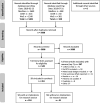Evaluation of 'implications for research' statements in systematic reviews of interventions in advanced cancer patients - a meta-research study
- PMID: 38124124
- PMCID: PMC10731681
- DOI: 10.1186/s12874-023-02124-y
Evaluation of 'implications for research' statements in systematic reviews of interventions in advanced cancer patients - a meta-research study
Abstract
Background: Implications for research (IfR) sections are an important part of systematic reviews (SRs) to inform health care researchers and policy makers. PRISMA 2020 recommends reporting IfR, while Cochrane Reviews require a separate chapter on IfR. However, it is unclear to what extent SRs discuss IfR. We aimed i) to assess whether SRs include an IfR statement and ii) to evaluate which elements informed IfR statements.
Methods: We conducted a meta-research study based on SRs of interventions in advanced cancer patients from a previous project (CRD42019134904). As suggested in the Cochrane Handbook, we assessed if the following predefined variables were referred to in IfR statements: patient, intervention, control, outcome (PICO) and study design; concepts underlying Grading of Recommendations, Assessment, Development and Evaluation (GRADE) domains: risk of bias, inconsistency, indirectness, imprecision, publication bias. Data were independently extracted by three reviewers after piloting the data extraction form. Discrepancies were resolved in weekly in-depth discussions.
Results: We included 261 SRs. The majority evaluated a pharmacological intervention (n = 244, 93.5%); twenty-nine were Cochrane Reviews (11.1%). Four out of five SRs included an IfR statement (n = 210, 80.5%). IfR statements commonly addressed 'intervention' (n = 121, 57.6%), 'patient ' (n = 113, 53.8%), and 'study design' (n = 107, 51.0%). The most frequent PICO and study design combinations were 'patient and intervention ' (n = 71, 33.8%) and 'patient, intervention and study design ' (n = 34, 16.2%). Concepts underlying GRADE domains were rarely used for informing IfR recommendations: 'risk of bias ' (n = 2, 1.0%), and 'imprecision ' (n = 1, 0.5%), 'inconsistency ' (n = 1, 0.5%). Additional elements informing IfR were considerations on cost effectiveness (n = 9, 4.3%), reporting standards (n = 4, 1.9%), and individual patient data meta-analysis (n = 4, 1.9%).
Conclusion: Although about 80% of SRs included an IfR statement, the reporting of PICO elements varied across SRs. Concepts underlying GRADE domains were rarely used to derive IfR. Further work needs to assess the generalizability beyond SRs in advanced cancer patients. We suggest that more specific guidance on which and how IfR elements to report in SRs of interventions needs to be developed. Utilizing PICO elements and concepts underlying GRADE according to the Cochrane Handbook to state IfR seems to be a reasonable approach in the interim.
Registration: CRD42019134904.
Keywords: GRADE; Implications for research; Meta-research; Oncology; Systematic reviews.
© 2023. The Author(s).
Conflict of interest statement
The authors declare no competing interests.
Figures

Similar articles
-
Clinical and methodological implications for research elements in systematic reviews on COVID-19 treatment were often unstructured and under-reported: a metaresearch study.J Clin Epidemiol. 2024 Feb;166:111236. doi: 10.1016/j.jclinepi.2023.111236. Epub 2023 Dec 8. J Clin Epidemiol. 2024. PMID: 38072174
-
The future of Cochrane Neonatal.Early Hum Dev. 2020 Nov;150:105191. doi: 10.1016/j.earlhumdev.2020.105191. Epub 2020 Sep 12. Early Hum Dev. 2020. PMID: 33036834
-
Effectiveness and safety of manual therapy for knee osteoarthritis: An overview of systematic reviews and meta-analyses.Front Public Health. 2023 Feb 24;11:1081238. doi: 10.3389/fpubh.2023.1081238. eCollection 2023. Front Public Health. 2023. PMID: 36908468 Free PMC article.
-
Beyond the black stump: rapid reviews of health research issues affecting regional, rural and remote Australia.Med J Aust. 2020 Dec;213 Suppl 11:S3-S32.e1. doi: 10.5694/mja2.50881. Med J Aust. 2020. PMID: 33314144
-
Acupuncture treatment of facial spasm: An overview of systematic reviews.Medicine (Baltimore). 2022 Dec 16;101(50):e32182. doi: 10.1097/MD.0000000000032182. Medicine (Baltimore). 2022. PMID: 36550879 Free PMC article. Review.
References
-
- Lund H, Juhl CB, Nørgaard B, Draborg E, Henriksen M, Andreasen J, Christensen R, Nasser M, Ciliska D, Tugwell P. Evidence-Based Research Series-Paper 3: Using an Evidence-Based Research approach to place your results into context after the study is performed to ensure usefulness of the conclusion. J Clin Epidemiol. 2021;129:167–171. doi: 10.1016/j.jclinepi.2020.07.021. - DOI - PubMed
-
- Lund H, Juhl CB, Nørgaard B, Draborg E, Henriksen M, Andreasen J, Christensen R, Nasser M, Ciliska D, Clarke M. Evidence-based research series-paper 2: using an evidence-based research approach before a new study is conducted to ensure value. J Clin Epidemiol. 2021;129:158–166. doi: 10.1016/j.jclinepi.2020.07.019. - DOI - PubMed
Publication types
MeSH terms
LinkOut - more resources
Full Text Sources
Medical
Research Materials

